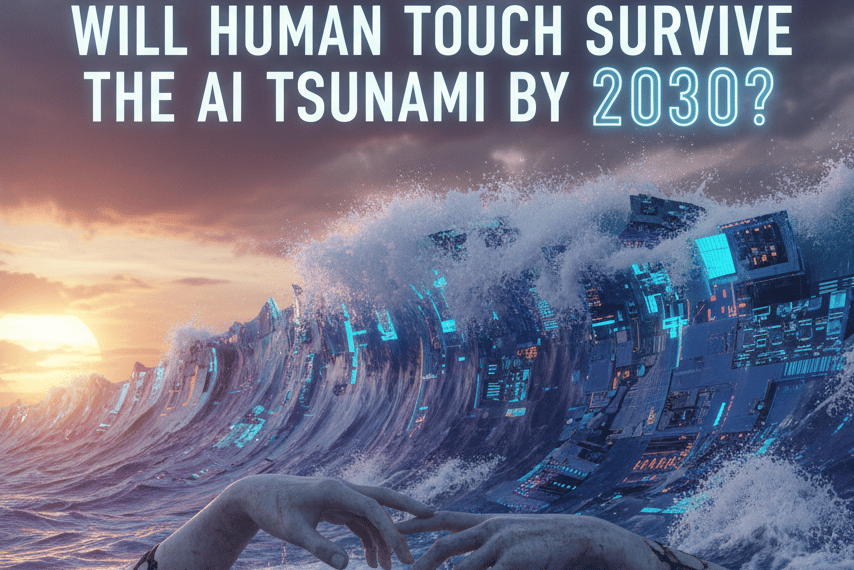Teachable moments #59 - The Heart vs. The Algorithm: Will Human Touch Survive the AI Tsunami by 2030?
Ang Woon Jiun
10/27/20253 min read


The Heart vs. The Algorithm: Will Human Touch Survive the AI Tsunami by 2030?
Hello connections,
Lately, I've been wrestling with a big question that keeps many of us up at night: As AI and automation rapidly redefine "efficiency," what happens to the human heart in service? And looking ahead to 2030, when some predict AI's intelligence will have multiplied a million-fold, will there still be a place for us, the messy, empathetic, brilliantly imperfect humans?
It feels like we're standing at a precipice, watching a tidal wave of intelligent automation rush towards us. The trends are undeniable: chatbots getting smarter, predictive analytics anticipating our needs before we even voice them, and algorithms streamlining everything from supply chains to customer onboarding.
The Allure of AI Efficiency: A Double-Edged Sword
There's no denying the immense benefits AI and automation bring:
Speed & Scale: AI can process information and execute tasks at speeds no human can match, serving millions simultaneously.
Cost Reduction: Automating routine queries and processes significantly cuts operational expenses.
24/7 Availability: AI never sleeps, offering round-the-clock support and instant responses.
Personalization (of a sort): Algorithms can analyze vast datasets to offer hyper-targeted recommendations and experiences.
These aren't just buzzwords; they're transforming how businesses operate and how customers interact with brands. But in this relentless pursuit of efficiency, are we inadvertently designing the "human" out of service?
The Looming Question: A Million Times Smarter AI by 2030
Let's fast-forward. If predictions hold true, and AI's capabilities truly skyrocket by 2030, capable of complex reasoning, nuanced understanding, and perhaps even simulated empathy, what then? Will the human touch become an expensive, inefficient relic? Will we relegate it to niche luxury markets, like bespoke tailoring in an age of mass production?
My short answer is: No. Not if we're smart.
The Irreplaceable Human Element: Why We'll Still Matter by 2030
Here's why I believe the human touch won't just survive, but will become more valuable than ever, even with super-intelligent AI:
True Empathy and Emotional Resonance: AI can simulate empathy, but can it feel it? Can it genuinely understand the nuance of a customer's frustration, the joy of a perfect solution, or the need for a comforting presence during a crisis? Human connection provides validation, trust, and emotional support that algorithms simply cannot replicate.
Complex Problem Solving & Creativity: While AI excels at logic and data, humans still hold the edge in truly novel, unstructured problem-solving that requires lateral thinking, intuition, and creative leaps. When the system breaks down in an unexpected way, or a customer has a truly unique need, a human expert's adaptability will be indispensable.
Building Genuine Relationships & Trust: We connect with people, not machines, on a deeper level. Trust is built through shared experience, mutual understanding, and consistent, authentic interaction. In a world awash with automated interactions, the companies that facilitate genuine human relationships will stand out. This is particularly true for high-value transactions, sensitive issues, or moments that truly matter to a customer.
The "Human Exception" & Escalation: Even with hyper-advanced AI, there will always be situations that require human judgment—ethical dilemmas, highly sensitive personal data, or simply when a customer prefers to speak to a person. The ability to seamlessly escalate to a human who is empowered and well-informed will be crucial.
AI as an Enabler, Not a Replacement: This is key. By 2030, the most successful service models won't be human or AI; they'll be human with AI. Imagine human service professionals armed with AI that instantly pulls up comprehensive customer histories, anticipates next steps, and suggests solutions. This frees humans to focus on the truly empathetic, complex, and relational aspects of service. AI handles the mundane, the human handles the magnificent.
The Path Forward: Embracing the "And"
The future of service isn't about choosing between heart and algorithm. It's about intelligently combining them. It's about:
Designing for Human Handoffs: Knowing precisely when and how to transition from AI to human, making it seamless for the customer.
Empowering Human Agents: Giving our service teams the tools, training, and trust to handle complex, emotional, and relationship-building interactions.
Investing in Emotional Intelligence: Recognizing that EQ will be a more valuable skill than ever for service professionals.
By 2030, the ability to weave human empathy into a tapestry of AI efficiency won't just be a competitive advantage; it will be the hallmark of truly customer-centric organizations.
What are your thoughts? Do you believe the human touch will remain relevant, or are we heading for an entirely automated service landscape?
Follow Us
Let us easily communicate, share ideas, and build relationships all over the world.
Sign Up For News And Exclusives
© 2024 to 2026 The Talent Craftsmen. All rights reserved. UEN T25LL0478E
